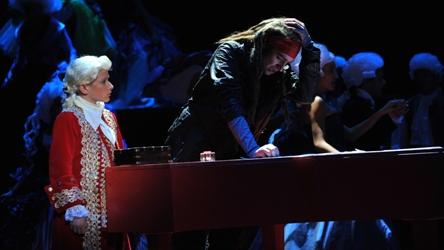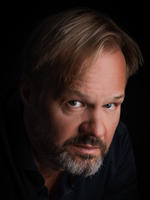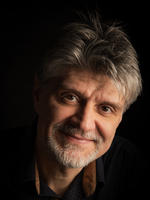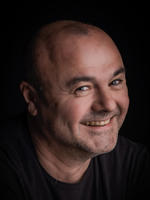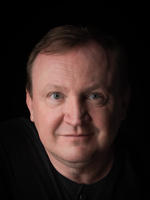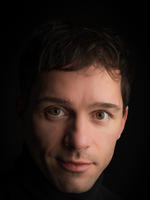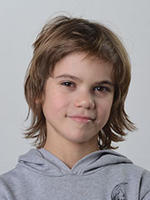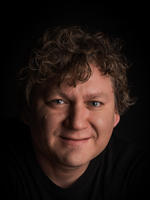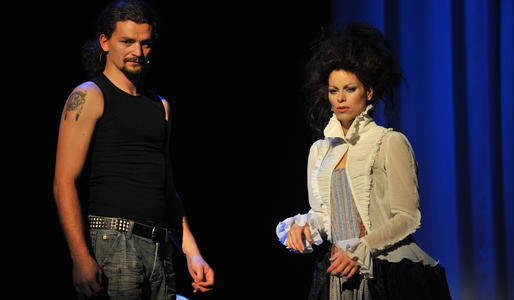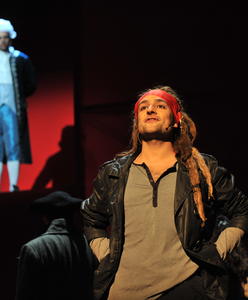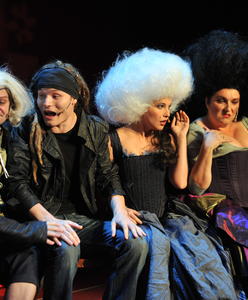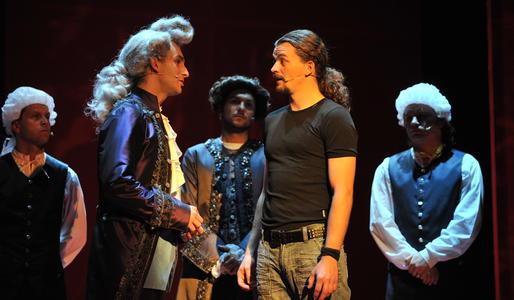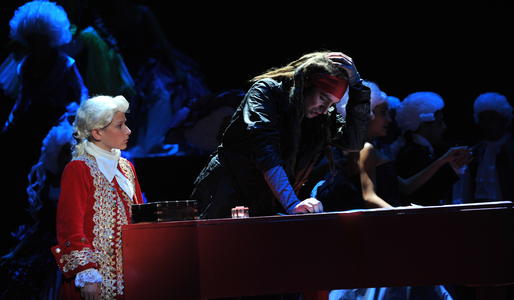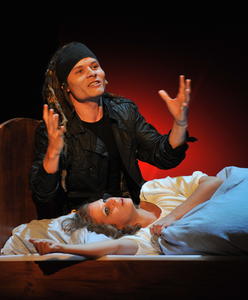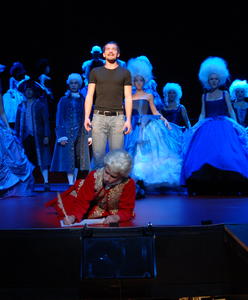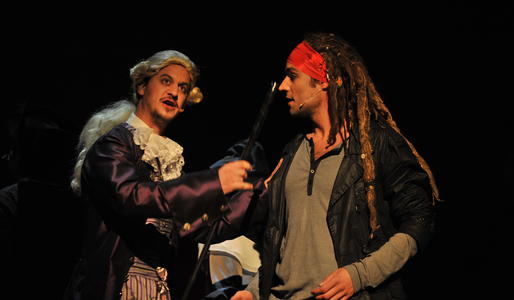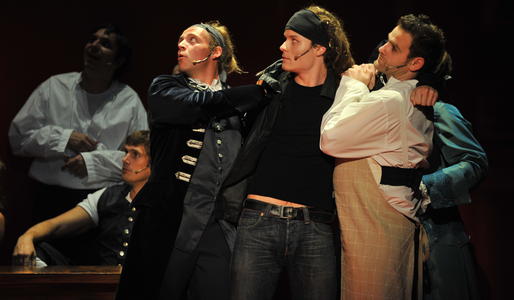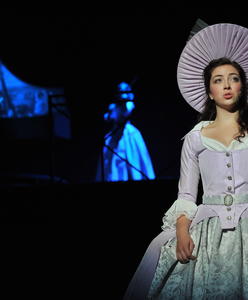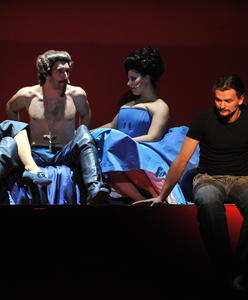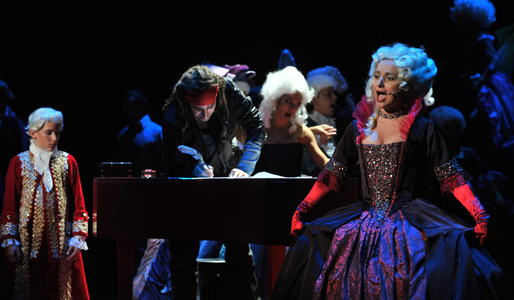Mozart as a pop musical in a new, elegant guise
Patrik Fridrichovský 10. November 2009 zdroj Divadelní noviny
(When a musical has the hearts and minds of its creators behind it)
Czech enthusiasts used to go and see good musicals from Michael Kunze and Sylvester Levay's workshop in Vienna or Budapest, with only one question: When will these ambitious and yet spectator-friendly musicals be finally presented on the domestic stage? Which theatre will dare to face up to this demanding task?
Domestic commercial stages do not have such a sophisticated attitude. They fear it would be an uncertain investment. On the other hand, non-profitable theatres cannot gather together the huge agglomeration of talent, expertise and finance that is needed for such a style of production as is found beyond our borders.
Finally, a clear answer was presented by this year's season at Brno City Theatre. Brno's go-getting dramaturgical team made what in chess would have been a cunning move. Mozart is a sufficiently well-known and interesting "artistic character" for Czech spectators so… why not give it a try?
A pop idol and a porcelain geniusThe question is - how does one write a musical about a genius composer whose life is at least a little familiar to each of us, at least from the Hollywood film by a Czech film director. He's a classic figure whom Czechs make their own by pronouncing the letter "z" in the middle of his name as ''z'' rather than ''ts''.
First of all, it would be a mistake to assume that it is yet another biography. Right from the beginning, the authors began with asking philosophical questions: What was the relationship between the genius and his authoritative father? Where does the freedom of the artist end, and where does manipulation start? In the fundamental triangle of the drama, one can see Leopold Mozart and his son, who is split into the figures of Mozart and Amadé. Mozart is a person from beyond the borders of the usual, a pop idol with the character of an ordinary person accompanied by a "small porcelain genius" who presents the innocent face of a genius who is completely involved in music.
It is already obvious from this brief description that spectators who are ready for everyday entertainment will have to strain their senses a bit more this time. However, the creators didn't want to bore or educate them at any cost. We are still within the bounds of musical theatre, and this is where yet another refined and very impressive authorial trick is present. With minor exceptions, the creators use the original music which was composed for the musical and which works as an engine for the dramatic action for the whole of the performance. Sometimes, it shines with melody and then humbly returns to dramatic functionality once again.
Some of the hits sound as if they could be from Falco's repertoire, which evokes interesting Mozart-themed connotations in connection with the life story of this well known Austrian singer. I would be surprised if the authors hadn't given this some consideration. The orchestral aspect combines the colours of symphony with electronics in a clever way, it paraphrases classicist techniques (because the play is about Mozart), but it also ventures into the territory of refined rock. Due to this, the orchestra has some unusually difficult tasks to fulfil.
As has already been said, a substantial part of this drama-musical lies in the narration of the story. The Czech translation is by Michael Prostějovský. He has already translated many world-famous musicals for the Brno theatre but despite that, Mozart! is certainly an interesting milestone in his text-writing career. It is obvious that he uses both German and Czech with clear lightness and certainty. He can afford to play with the interchanging use of Czech and German and offer a "Viennese delicacy" in the ironic choral performance Hier in Wien.
The production is built mainly on a wide and well-balanced resource of musical talents for the main roles, and a well-coordinated ensemble. Aleš Slanina's Mozart carries the performance the whole time; apart from talent and the necessary acting skills this role requires a great helping of athletic preparation. However, the others do not stand in the background; for example, the performances of Michal Šebek in the role of Father Leopold and Jana Musilová in the role of Baroness von Waldstätten are also worthy of appreciation.
It is best to speak about this production as one whole which consists of many components which work together subtly and yet perfectly. For Stano Slovák, Mozart! is the first large and clearly 'grown-up' directorial experience, with a clear original conception and style, in a seemingly simple set by Jaroslav Milfajt which complements the action and rhythm of the production. It was certainly expected that Andrea Kučerová's costumes would help create the Mozart-like atmosphere. The spectators will certainly witness this when, for example, fantastical figures appear in the Magic Flute scene.
The most precious thing about the Czech debut of the musical Mozart! is that it took place at Brno City Theatre. In comparison with the production which could be seen e.g. during the premiere in Vienna, it certainly isn't second class. This is a happy discovery when such a demanding piece is concerned. In Brno, they perform Mozart in their own way, with a sufficiently mature ensemble which manages such a demanding production with pride. One can understand this as indicative of future promise. Vienna's musical scene has certainly been a very interesting alternative to much louder successes from London and Broadway in the last decades, and perhaps Brno has entered a new stage of interesting work.
Success of the month: Michael Kunze, Sylvester Levay: Mozart!
3. November 2009 zdroj Divadelní noviny
Brno City Theatre, music production by Caspar Richter, director: Stano Slovák
With their production of the musical Mozart!, Brno City Theatre and its Music Stage have ventured beyond a one-sided orientation towards Broadway and West End. This work utilizes the experience gained from staging the best musicals but is set in a central European context, moreover, featuring the theme of a genius who lives an ordinary life amidst average common society. In this endeavour, Moša's ensemble has measured its strength against one of the most technically demanding parts ever to have been written in this field. Mozart! is an exceptional work, and its performance has become an exceptional event.
Mozart! back in Brno after 242 years
Vítězslav Sladký 18. October 2009 zdroj www.musical-opereta.cz
Right at the beginning of this year's theatrical season, Brno City Theatre successfully excelled itself with a historically important dramaturgical event when it showed a musical written by the authorial duo Michael Kunze – Sylvester Levay on its Music Stage as the first theatre in the Czech Republic to do so. Very successful all around Europe and Asia, they have been somewhat less successful on Broadway and are almost totally unknown here. If a typical Czech theatregoer knows something from their musical output (both are authors of tens of hits for various singers) it will probably be Zdeněk Borovec's Czech translation of the title song from the musical Elisabeth "I belong to me", sung by Leona Machálková some time ago; this Czech version, ''Já chci být jen svá'' , was the first song on her 1998 album Leona – Film a muzikál (Leona – Film and Musical). It thus was time to end the absence of such an interesting and successful creation from our theatre stages. Prague's theatres, unfortunately, wasted their chance as they prefer to continue giving opportunities to the songsmiths of several domestic authorial teams whose productions are often not particularly great. Therefore, Brno City Theatre seized this opportunity and as has already happened several times, it cleverly grabbed an attractive work right from under the noses of other producers.
For many years I've been hearing: "Why show Kunze's musicals, no one would come to see them here…" It's a mistake - they are sufficiently attractive, nicely crafted, and we often know many of their hit songs but are unaware that they come from the score of a musical. Also, their heroes usually have a historic link of interest to Czech audiences - the life story of Empress Sisi is known by nearly everybody from books and films (Elisabeth), the novel Rebecca by Daphne du Maurier ranks amongst the jewels of romantic literature, and Wolfgang Amadeus Mozart (Mozart!) stayed not only in Prague but also in Moravia when he was a child. Episcopal Olomouc offered asylum to the family during the period when both siblings, Wolfgang and Nannerl, fell ill and were looked after by a high clerical dignitary. There, the eleven-year-old Mozart composed the 6th symphony in F major (KV 43), known here as 'the Olomouc symphony'. On Christmas Eve, the Mozarts were in Brno, and on 30th December 1767, the "miracle siblings" performed in a concert at what was then the city theatre at the Cabbage Market. From this point of view, Mozart has returned to the 'scene of the crime' after 242 years…
Kunze and Levay don't write "lyricals" as is common in our theatres. They call themselves creators of "drama-musicals", though this description isn't so much a synonym of drama as such but rather refers to the dramatic structure of the work. Surprisingly, while their titles usually involve a real historical figure, they aren't biographical and follow only one certain thread of the selected character's life, with the help of an inventively written plot. Michael Kunze seems to have created a particular authorial style in the way he confronts the heroes with an imaginary or invented character almost every time. In Elisabeth, the partner and counterpart of the empress Elisabeth is the attractive Death (or maybe Fate?), in Mary Antoinette it is a ''child of revolution", poor Margrid Arnaud, and in Mozart it is "perfection" represented by the figure embodying porcelain Amadeus. This is a fresh and clever approach. At the same time, Michael Kunze, for example, absolutely ignores Mozart's famous (and perhaps unnecessarily exaggerated) fight with Antonio Salieri, his competitor as a composer. Perhaps only as a test of the spectator's ability to notice things, the creators inserted Salieri among the choir singers at the beginning of the first and second act. Do they use this as a symbol of the incomparable generation-spanning importance of the work of both rivals…? In the chosen concept, they depict Mozart mainly as a person - a genius but vulnerable, misused, in love, disobedient, and as a superstar, dreamer and player…
There is no need to conceal the fact that Elisabeth, Kunze and Levay's first musical mega-success, is more inventive and richer as far as music is concerned. Also, the title "rock musical" isn't completely accurate - only Wolfgang Amadeus's part can be considered to be 'rock', and even that fits into the softer side of this genre. Otherwise, the score is rather that of a pop opera. In its form, the musical approaches Singspiel - again, I'm convinced that this is on purpose - which developed as a form of opera in the 18th century and which contains singing parts complemented with shorter recitatives. Even though a few numbers are examples of somewhat ubiquitous "German pop", the majority of them are very good, melodically interesting and easy to remember. Among the stunning choir scenes, the very first one stands out - "What a son". It follows on from the prologue, a part of which is also the end of the 3rd variation in D major for piano from the heritage of the famous Amadeus, and which is also repeated in the musical as a motif. Gospel elements can be found in the choir songs in the second act. As far as solo songs are concerned, arias by Mozart, his father Leopold or the beautiful narration by Baroness von Waldstätten make an attractive contrast with the vaudeville of the Weber family and Emanuel Schikaneder. Several times, as can be expected, I heard people wondering whether Mozart’s music shouldn't have been heard in the piece more often, but I can't see any reason for this - the spectators came to see Levay, not Mozart.
Doc. Peter Stoličný, our permanent co-worker, has already described the production in his extensive review. And therefore only briefly - director Stano Slovák, as well as both of the creators of this work, have served it well, without that personal exhibitionism which can be seen so often. All of the scenes are constructed very carefully and purposefully. Stanislav Slovák, in cooperation with choreographer Igor Barberić, disposed of his reputation for being a director of somewhat static scenes and both of them have got both the main actors and their extensive company moving in a way that is without precedent. In contrast with the Vienna version, Brno's production has undergone several small alterations, such as when Schikaneder's song was moved to the second act and the reminiscence of Mozart's Requiem logically shifted up to the end of the play - it is a generally known fact that the composer didn't finish it due to his untimely death (he died when he was only thirty-five, reportedly of a renal pelvis inflammation, even though it was long a subject of speculation as to whether he might have been poisoned by Salieri).
Another strong point of the production is its artistic execution, which doesn't lack logic, beauty or wit (with a short passage from the Magic Flute featuring Andrea Kučerová's great costumes). The stage by Jaroslav Milfajt is, completely logically, dominated by red, the most popular colour for interiors from the period of classicism and not only for them - even Mozart himself is depicted in many period paintings in a red costume. Opera-glass changes then give new space for the spectator's imagination.
During the second premiere, the orchestra of Brno City Theatre presented a completely convincing performance under the baton of conductor František Šterbák. The conductor is also the author of the whole musical production, which was also supervised by Caspar Richter, a connoisseur of Levay's music and an almost pedantic "technician" among conductors. Perhaps the greatest praise should go to choir master Karel Škarka, who led the ensemble to a very precise performance, under significant time pressure; in the second premiere the company sang their way through a score with difficult lead-ins and not very easy multi-voice sections in really great style and with polished dynamics.
During the second premiere, Aleš Slanina had the opportunity to be in the title role; previously, he had acted mainly in smaller roles, if we don't count Ferdinand from Mamzelle Nitouche and the Prince in Snow White. This seemingly risky choice proved to be a good one - he used this opportunity well and surprised the audience not only with a very decent singing performance but particularly with an excellently performed range of emotions suitable for a rascal and cheeky adolescent. He lent unharnessed energy and almost constant motion to his performance. Michal Šebek, in the role of Amadeus's father Leopold, tried to play him with precisely defined strict expression, but he seemed to me a bit too young to be the composer's father. The ladies were interesting - Hana Holišová as Constanze Weber, and Jana Musilová, who acted the role of Baroness von Waldstätten with her hit "Gold von den Sternen" with cultivated presentation and feeling. Very distinct characters in the musical were also Jiří Mach as Hieronymus Colloredo, Lukáš Vlček as Count Arco as well as Milan Němec in the rewarding, though episodic role of the principal Schikaneder. Rastislav Gajdoš, Lenka Bartolšicová, Lucie Šauerová, Svetlana Slováková and Eva Jedličková entertained the spectators in the mostly comically tuned passages featuring the Weber squad. A character that is extremely important for the plot is young Amadé, a porcelain idol who accompanies Mozart through all of his critical situations. It is a silent role, i.e. a very difficult one, and Amadé was given slightly less space in Brno than in foreign productions. Despite that, Marek Hurák characterizes him very exactly and convincingly.
So, a musical by the famous authorial duo Kunze-Levay has, to the joy of many fans of their work, finally appeared on Czech stages. One could say it was "late", but at least it has happened…! Michaela Prostějovský's contribution as a text writer also needs to be pointed out here - he not only wrote the poetic translation but also tirelessly kept offering and finally brought about a meeting with both authors who visited Brno on 4th October, at the second Sunday premiere of their musical.
If I am to be entirely honest, Brno's Mozart! is probably the fourth production at Czech theatres in the last ten years for which I wouldn't hesitate to spend the five hundred crowns for a ticket. It is a brilliant piece, and I hope that the ice will soon break and we will also get to see Elisabeth, Rebecca or Dance of the Vampires.
Brno musical earned international recognition
(the) 10. October 2009 zdroj Haló noviny
The authors of the world famous musical Mozart! visited its Czech premiere at the Music Stage of Brno City Theatre on Sunday in person. They were accompanied by national artist Karel Gott at the completely sold out performance.
The musical Mozart! is their third work. The premiere took place in Vienna in 1999. Since then, the musical has been shown e.g. in Hamburg, Budapest and Tokyo. The Czech premiere took place exactly on the day of the fifth anniversary of the launch of activity of this top Brno musical theatre which is gaining more and more recognition also abroad.
"I'm very happy that we can celebrate this small anniversary with such a great deed because the musical Mozart! has conquered even the greatest international musical scenes since its world premiere ten years ago, " said the director of Brno City theatre, Stanislav Moša. He pointed out that within only five years, thirty titles have been shown at this theatre, amongst which are, for example, the world famous musical hits Les Misérables, Evita and Jesus Christ Superstar. Some of Brno's productions were Czech or even world premieres.
The author of the musical Mozart!, composer Sylvester Levay, as well as librettist Michael Kunze, are very satisfied with the Brno production of their work. "Both of us always concentrate on the reactions and emotions of the audience during premieres. We felt that the audience reacted wonderfully from the beginning till the end - it was involved in the play and enjoyed it. We think that the Czech production was successful," said the composer Levay. He emphasised that Mozart! is quite demanding as far as the musical aspect is concerned, but he praised the Brno orchestra as well as the protagonists highly. Apparently, he will also be coming to view a reprise so that he can see other alternates act. The librettist Kunze appreciated the fact that director Stano Slovák and his production team avoided an excessively realistic approach and used a lot of imagination.
The reaction of the audience was warm; applause could also be heard during the individual scenes. The final standing ovation lasted almost a quarter of an hour.
Hats off to Mozart!
Peter Stoličný 8. October 2009 zdroj musical-opereta.cz
It doesn’t happen very often that a musical from a workshop other than Cameron Mackintosh's London production team, or from Broadway, would make its way into the great world of theatre. The German authors of the musical Mozart! have done it. Michael Kunze and Sylvester Levay (the first was born in Prague, and the other is a Hungarian who was born in Subotica) had already previously created one successful project together - it was the musical Elisabeth at the Theater an der Wien. The premiere of Mozart! took place also at the same theatre in 1999, and their last work together is a drama - the musical Rebecca at the Raimund Theatre in Vienna. European stages are also gradually being conquered by Marie Antoinette, first performed in 2006 in Japan.
These two authors, who worked on various productions separately before, are connected by their opinion on musicals. Kunze started out as a successful German pop music text writer, and a translator of librettos for Webber's famous musicals into German. Levay composed songs e.g. for Udo Jurgens, Elton John and others. He lived in Hollywood for 20 years and wrote film music. Since 1990, he has been living in Hamburg and working on musicals. The roots of both authors' work are connected with the most fruitful period of contemporary world musical production. From Galt Mac Darmot (Hair) to Lloyd Webber (Phantom of the Opera and others) and Claude-Michael Schönberg (Les Misérables and others). So what is the connecting, one could say continual approach to the work? It is mainly a genre, content-based approach.
The musical, as a continuation of Singspiel and operetta, was originally mainly an entertainment genre (Show Boat, Hello Dolly, My Fair Lady and so on). It is in the second wave of the sixties that the Shakespeare-Bernstein drama West Side Story and The Fiddler on the Roof by Jerry Bock and Sheldon Hanick appear. Suddenly, there were works with aims not limited to merely entertaining the spectators, despite their striking visualisation and dance creations, but bring them to a certain anagnorisis due their strong intellectual charge, conveying fateful meetings in conflicts with the humanistic ideals of society.
If we find such similarities in the contents, why shouldn't they also appear at the musical level? I have to admit that when I first encountered the musical Evita, the dispute of the main protagonist, Evita, with Che Guevara was all too similar to the quarrelsome duet of the Thénardiérs' couple from Les Misérables. Similarly, I can find a lot of affinity in several theatrical musical themes in Mozart and in Webber's works. I started by investigating what was first, whether it was Evita or the original Les Misérables performed in Algeria a lot earlier than it was discovered by London's Mackintosh in London (these works were created in the same year). However, I realized that there is no point in looking for what came first in the case of a musical idea. Do we think about whether the classical waltz appeared in the operetta thanks to Strauss, Kálmán or Lehár these days? Or whether this waltz was first used in the operetta by Millöcker? This doesn't matter at all any more…
It is very likely that today we are witnessing the gradual codifying of the musical drama genre - that's why there is a certain similarity between works in terms of content and music. Therefore, one can only state that musical dramas differ in one thing and that is the quality. On the one side, there is for example Czech productions (Golem - by Svoboda and Zelenka, Dracula - by Svoboda and Borovec, Cleopatra - by David and Borovec etc), which aim mainly at the presentation of pop stars - they fill up the cash registers of the enterprises, and attract mainly superficial and theatrically as well as intellectually inexperienced spectators who want to see their idols in the flesh. At least, thanks to this, spectators who usually spend their time sitting in front of TV serials get into the theatre! However, these works hardly approach the standards of real musical-dramatic art. On the other side, there are mature productions which don't need media stars to gain their "place in the sun". What they need is a high professional standard from all those who take part in the production - and this is the case with the last premiere at Brno City Theatre where Mozart! was the thirteenth Czech and the thirtieth premiere in total in the five years of the existence of Brno City Theatre's Music Stage.
Before I start writing about the production, I have to remember the unlucky beginning of the first premiere. Perhaps it was the work of fate (the thirteenth Czech premiere), possibly after the first thirteen minutes, one of the main protagonists, Mozart's father Leopold, acted and sung magnificently by Jan Ježek, was injured: Behind the stage, his leg became caught in heavy stage machinery (a so-called moving "table'') and it damaged his leg severely (several toes got broken). He was immediately transferred to a hospital and within twenty minutes (but perhaps only thirteen?), an excellent alternate, Michal Šebek, was ready for his role. The pause, and the shock for the spectators when director Moša appeared in front of the curtain and announced what had happened, somewhat disturbed the flow of the first act. But nothing could be done, injuries sometimes occur in theatres - the whole theatre itself is very risky workplace. Deep respect has to be paid to all who created this premiere and acted in it, for they were able to perform so excellently despite this misfortune. But let's have a closer look at Mozart! (with an exclamation mark).
The story is very different from what the spectator might expect. It isn't Shaffer's Amadeus, which made the film director Forman so famous. It isn't about the dispute between Mozart and Salieri for the emperor's respect. The authors use autobiographical moments which can be read in Mozart's letters to his father Leopold and from Amadeus' correspondence with Constanze or Cecilia Weber. In our country, these letters were published by the Supraphon publishing house in 1982. Thanks to the above-mentioned authenticity, the play enabled a much deeper view into the relationship between the genius artist and his family, the environment which surrounded him, and into the relationship of Amadeus and his father Leopold. Genius and ordinariness, temperance and obscenity, boundless love and the egoistic possession of somebody. The despotism of a master and the dependence of a genius upon it. Obedience and revolt. Deep love and superficiality. One could say: a lot of juxtaposition. A lot of contrast. Water and fire, sword and bread.
One detail which helped the story a lot also needs to be mentioned. It is the character of the young Mozart, some kind of "porcelain person" who is a constant witness to Amadeus' life. Mozart, when feeling anxious or abnormally merry, or when going through a key event in his life, always comes close to this child/alter ego and usually communicates non-verbally with him. It is cleverly thought-out, correctly used and significantly imaginative, because if something is spelled out exactly so it’s absolutely clear, it stops being interesting. The spectator asks in many situations: Why did Mozart hug the little boy right now? Is it happiness? Anxiety? Or perhaps loneliness?
These questions bring us to the production of this work. It starts with the translation, or more accurately with the poetic translation of Michael Kunze's libretto. Almost a permanent translator at Brno City Theatre, Michael Prostějovský did a really sensitive job on it, giving the director a good base to build on. I have no idea what share the dramaturgists Klára Latzková and Jan Šotkovský have in the result but theatre always involves team work and so let's not ask how much everyone did. The text was prepared in an exemplary manner, as well as the brochure, which is filled with facts and which is also signed by Mr. Prostějovský.
This is already the third production directed by Stano Slovák, a graduate in acting and subsequently direction at the Janáček Academy of Music and Performing Arts, for the Music Stage. It is quite interesting to compare Slovák's acting and direction. As a musical actor, he is dynamic, impulsive, with well-developed movement skills, expressive acting and a full voice with a decent range. As a director, he is suddenly different. He is dedicated strictly to the pace and rhythm of the production, he doesn't rush anywhere, he enjoys the situations. While the musical Painted on Glass was somewhat static, which proved a bit of an obstacle, in Snow White the gentle fun with the dwarfs stood out nicely thanks to the well thought-out pace of the story. Mozart fully featured this well thought-out approach, with finely tuned pacing, including changes of pace.
Although Slovák has an actor's approach to direction, being an actor himself, he is simultaneously a perceptive conductor of the structure of mis-en-scenes. If it is necessary, he doesn't hurry; he lets the situation fade away so that it evokes a corresponding emotional resonance.
The beautiful and well thought-out stage by Jaroslav Milfajt helped the director greatly in his craft. We are already used to the fact that his scenography is always full of ideas and particularly functionality at Brno City Theatre, and also at Brno's National Theatre. It always provides a lot of options for the director. This is also the case with the musical "Mozart!". Large red surfaces stretch sideways as well as vertically, forming a series of "opera glasses" through which we penetrate the inside of the stage. Due to this, only a few hints are enough to help us perceive the illusion of a classical environment. Milfajt's stage simultaneously allows Andrea Kučerová's costumes to shine. The well thought-out scale of colours and shapes beautifully supplements the bright red background of moving screens and pelmets. The only thing that I didn't like so much was Mozart wearing contemporary jeans. I think there are many other expressive means of making him a person of flesh and blood, a genius and rebel who could have lived in the 21st century as well as in the 18th. And this isn't done via a costume but via life, and the way of life. Therefore, I found this superfluous descriptiveness a bit bothersome. But this is perhaps the only complaint which I have regarding the costumes - or, more accurately, the direction of the musical.
It is always a "problem" to describe the acting, singing and dancing artistry at Brno City Theatre, because one can only clap with enthusiasm, constantly and repeatedly, and praise which is repeated continuously becomes boring. And it really is so. The choir scenes aren't simple in this musical, so 'hats off' to their producer (choir master Karel Škarka). Also, the choir singers had to dance and move, and at a quite exhausting pace too (choreographer Igor Barberić)...
The production features two or three alternate actors for each role and one simply cannot say that the first alternate actor is better than the second or third. A flexible choice of protagonists for the individual performances is expected according to each actor's engagements, health dispositions etc. The work to be done on the production was thus doubled and tripled, which didn't make the director's life easier in any way. Moreover, this work was produced in record time. This demonstrates the really well thought-out management of the whole "theatrical machine". Hats off, hats off.
At the first premiere I saw the excellent Vitázek as Mozart. He was really a modern boy, a rebel, a cheeky person and an eccentric talent. I have already mentioned Mozart's father. Because Jan Ježek acted at the beginning, and after his injury, Michal Šebek continued, I could make comparisons. Ježek was more robust, both in his voice and in his expression. On the other hand, Šebek is more sensitive, with nuances of moods and attitudes. Due to this slight comparison, we had the opportunity to see the directorial work of Stano Slovák. He really develops everything from the standpoint of each actor's nature, from his/her character. He doesn't create a copy of a character, and so working with several alternates is more difficult. Another distinct character is Petr Gazdík's Hieronymus Colloredo. He has a really beautiful voice and an impressive way of expression. The permanent stars of Brno City Theatre are the girls - or rather ladies of the musical: Johana Gazdíková as Constanze, Markéta Sedláčková as Baroness Waldstätten, Svetlana Slováková as Josefa Weber. Each of them has a different colour of voice and slightly different expressive means; however, they never fail, they each have their own character and they fulfil their roles fully.
And so we could page through the cast one by one and continue praising. Brno City Theatre doesn't have bad actors. It usually doesn't deliver any false tones and doesn't have stiff dancers. It is a professional team which is "controlled", as far as the music field is concerned, by experienced conductors. One of them is František Šterbák, who was at the first premiere. The conductor doesn't have a simple job to do in this line of work. Typical musical melodies, orchestra and choirs mix with classicism. The singing parts sometimes start quite unexpectedly, sometimes the trio is quite complicated and the spectator - listener perceives only the whole, but the musicians, singers and the conductor? They always have to know what they are doing within the complex composition, and the first law has to be exactness. This must already be the third time I'm writing this but again: Hats off!
So now we come to the final evaluation: The musical, or musical drama "Mozart!" is yet another quality production from the Music Stage of Brno City Theatre. It is also an important dramaturgical piece and a good start for Stano Slovák as a director of what are known as the world's greatest musicals.
The authors liked Brno's Mozart!
Jan Trojan 7. October 2009 zdroj Právo
The authors of the musical Mozart!, which has been performed at Brno City Theatre since the weekend premiere - librettist Michael Kunze and composer Sylvester Levay - expressed their satisfaction with Brno's production to journalists.
"It is a successful adaptation. We both concentrate on the reaction of the spectators, on their emotions. We feel that the audience was reacting from the beginning till the end, it was involved in the play," Levay announced.
The Brno City Theatre production, directed by Stano Slovák, was full of imagination; the composer also liked the performance of the ensemble and the orchestra. Both authors saw the second, Sunday première. Levay wants to come back again to see other alternates.
He calls the musical Mozart! very demanding, complicated.
Kunze said about the producers: "You have brought Mozart back to life!" He added that the public keeps Mozart at a certain distance while this musical brings the composer close. "We don't bring a genius onto the stage but a person. And your production was successful in this - the audience understood that a genius can be controlled by someone, and that it keeps happening," the satisfied Kunze continued.
Kunze closed his speech with the, as he said, provocative statement that the only living form of musical theatre today is the musical.
Michael Kunze, Sylvester Levay: Mozart!
David Kroča 5. October 2009 zdroj Český rozhlas Vltava
The German musical Mozart! isn't a biography of the famous composer but rather an analogy regarding the conflict of genius with averageness, as we know, for example, from Schaffer's drama Amadeus or from Miloš Forman's film adaptation of the same name. To be specific, the musical focuses on the relationship between Mozart and his ambitious father, who literally becomes a tyrant in his efforts to bring up a genius. The ambivalent perception of fatherly love, which is affectionate and yet burns, penetrates the whole story as a leitmotif. The story captures the composer from his first performances as a child, continuing through his activities in Vienna up until the legendary creation of Requiem during which Mozart dies.
The duplication of the title character adds magical atmosphere as well as a symbolic character to the musical. Next to the real and ageing character, an imaginary figure of "a small porcelain genius" is also present throughout the story, a child role with the aim of offering Mozart a look into his 'inner mirror', thus enabling him to doubt his decisions. Director Stanislav Slovák, in cooperation with artist Andrea Kučerová, deepened the tension between both aspects of the protagonist by having the dream Mozart wear a Rococo costume while the real one takes the form of a contemporary young man who wears a T-shirt and jeans, has a tattoo on his shoulder and dreads in his hair.
The contemporary conception of the topic is definitely a plus point of this musical, as well the attempt to connect Mozart's period with the present. This is successful thanks to the innovative choreography by Igor Barberić, who connected the period characters with modern dance elements, but also thanks to the inventive stage by Jaroslav Milfajt. Images, as well as titles with the locations and dates of events, are projected onto a set of movable curtains and barriers, making it easier to orientate oneself in the plot. I can see a problem in the way individual scenes work only as independent numbers which, however, lack a relationship to the others and gradation. Slovák's direction shows gradation in the individual scenes but it leaves the conflict between the father's authority and the rebellious youth almost without any intensity - it all progresses as one would expect.
As far as the acting is concerned, it was balanced and really excellent at the performance which I saw. The third alternate in the main role, Lukáš Janota, wasn't a poor second to his more experienced colleagues Dušan Vitázek and Aleš Slanina - he mastered the demanding singing solos well, and he equipped the character of the modern Mozart with appealing roguery and rock rampancy. After Jan Ježek's injury, the role of the composer's father is played only by Michal Šebek - and he is doing excellently. His songs show great emotional power, particularly during the moments when Leopold Mozart realizes his guilt and debt towards his son, who is, in his eyes, still only a child. From the many other roles, the role of Mozart's wife Constance, performed by Hana Holišová, needs to be mentioned, as well as Petr Gazdík's Count Colloredo and the convincing baroness acted by Markéta Sedláčková.
Mozart! certainly won't get lost among the many musicals shown on our theatre stages. Particularly due to the above-average singing performances, a visit to the Music Stage of Brno City Theatre is certainly worth it.
God wanted a miracle and he named him Mozart
Jiří P. Kříž 5. October 2009 zdroj Právo
Brno departs from Broadway convention with the premiere of Kunze and Levay's rock musical
I find it already daring enough to attempt the theme of Mozart! after Shaffer's Amadeus, particularly after the film version by Miloš Forman (1982) and the theatrical versions derived from it. The librettist Michael Kunze and his faithful co-author, musician Sylvester Levay, were daring enough to do it.
Both of them are from the generation of sixtysomethings who grew up on the big beat and rock music of the sixties. Their musicals clearly depart from Broadway conventions, even though they regularly conquer New York (most obviously perhaps in the case of Kunze and Steinman's Dance of the Vampires, which was based on a Roman Polanski film). Artistic, demanding and unique, Mozart! has after Vienna, Budapest, Hamburg and Tokyo become the latest hit in Brno, and where else than at the Music Stage of Brno City Theatre.
A somewhat different musical
It doesn't happen very often that master of song Karel Gott visits theatre premieres. He had a good reason to come to Brno. Kunze as a text writer started his great career in Germany - from Lady Carnival up to Maya the Bee.
Another factor makes Kunze and Levay's musical Mozart! the musical event of the year. Michael Prostějovský translated this work from German into Czech and he proved again, in accordance with the artistic line of the most successful contemporary musical theatre author on the continent, that a musical text can also be a work of poetry. Instead of all possible arguments, let's name his Jesus Christ Superstar, Evita, Joseph and the Amazing Technicolor Dreamcoat…
The authors themselves were full of praise. They called the Brno premiere one of the best ones. They diplomatically confirmed the fact that they themselves value the Japanese version the most. However, musicals which depart from the commercialism of musical America have been created there for a long time, and systematically. The impressiveness of this performance, the (by Czech domestic standards up to now) rarely achieved level of professionalism of the Brno musical which has catapulted Brno City Theatre into Europe, is largely due to the direction by Stanislav Slovák, demanding due to its blending of layers of images, and also the inventive acting ensemble, exemplarily trained in all the possible forms of movement, and perfectly employing Igor Barberić's choreography.
Andrea Kučerová's costumes go well enough with the rock genre - both the rebellious 'protest' image of the main character and the artistically well-made stylization of Rococo Salzburg and Vienna. This stood in contrast with the really simple stage by Jaroslav Milfajt, featuring decorative video projection decorations by Petr Hloužek…
On conflict with society
This, one of the most demanding and also melodically rich musicals, was sometimes more than the otherwise perfectly trained actors could manage, e.g. Marta Prokopová's intonation (Nana Mozart). However, there were many very well-mastered roles - as far as singing, dancing and performance are concerned - played by Aleš Slanina (Mozart, alternates Dušan Vitázek, Lukáš Janota), Michal Šebek (Mozart's father Leopold, alternate Jan Ježek, who was injured during the Saturday premiere), Hana Holišová (Constanze Weber, with Johana Gazdíková,), Jana Musilová (Baroness von Waldstätten, with Markéta Sedláčková...)
Kunze's and Levay's Mozart! is not a confrontation with the creative path of a musical genius. It aims to provide a general contemplation on the desire for creative freedom in a period full of authorities and conventions.

